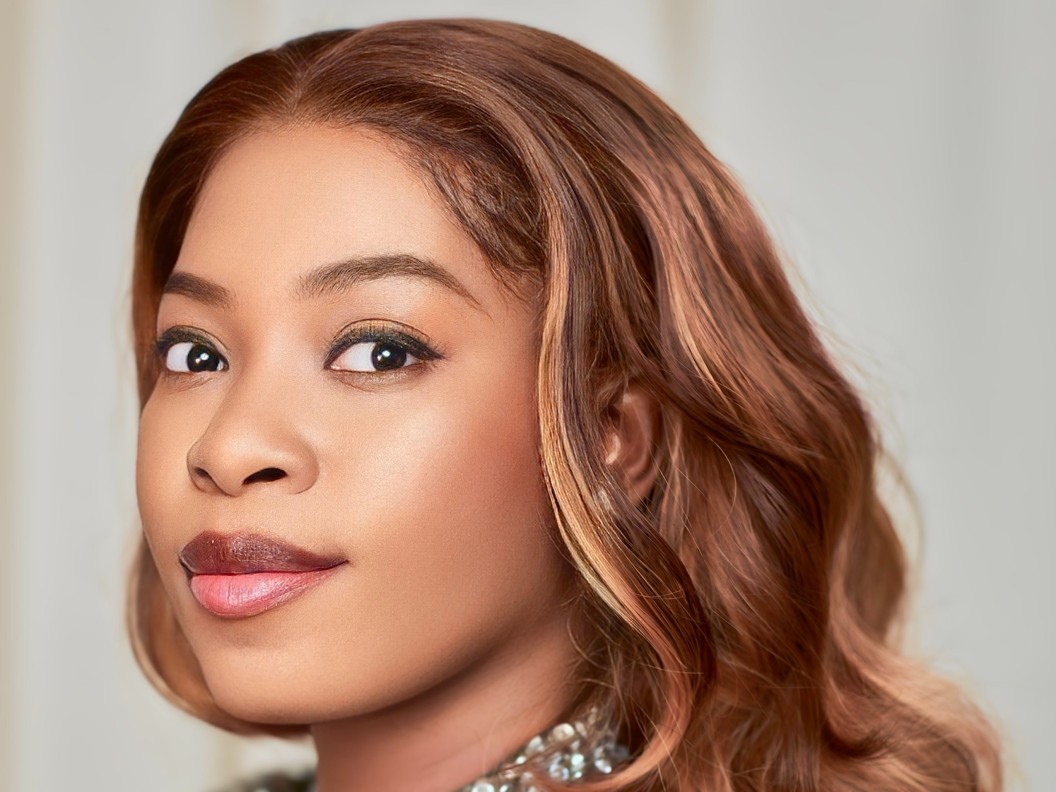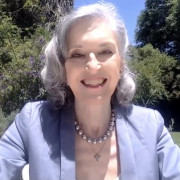- Science News
- Frontiers news
- Glory Oguegbu - The power of the female
Glory Oguegbu - The power of the female
Author: Carolina Capelo Garcia
Glory Oguegbu is an award-winning climate change activist, working to bring solar power and renewable energy to communities in Nigeria without electricity. Glory is chief executive officer of the Renewable Energy Technology Training Institute (RETTI), founder and executive director of the Glow Initiative for Economic Empowerment, and currently an Obama Scholar at Columbia University. As we approach 2024 exploring the ways in which women’s initiatives are driving to sustain our nine planetary boundaries, and celebrating the UN International Day of Clean Energy, there was no one I’d have more pleasure in talking to, and learning from, than her.

Glory, you are a leading climate specialist, energy transition expert, and sustainability entrepreneur, yet all of us start somewhere. What drew you into climate literacy and the importance of renewable energy?
“My starting point was a campaign that I came across a few years ago by the World Wildlife Fund that showed an image of a baby who looked disfigured and a sentence saying, ‘Stop climate change before it changes you.’ That scared me. It instilled a fear in me that I call a ‘good fear.’ I asked myself why no one was talking about this in Nigeria. This jumpstarted my interest in researching climate change back in 2015. I was concerned about my country.
“I found a lot of the effects of climate change within agriculture were not issues that may happen in the future. They were already happening now, in the present, with droughts in northern Nigeria, which is an arid region. People could no longer find water, and we didn’t know this to be already linked to climate change. That made me want to talk about this problem. I started advocating about environmental protection in Nigeria, but no one understood what I was saying. The issue was deeper than I thought because there were no materials for Africa to educate Africans. I found a lot of content for the West, but nothing for Nigeria. I couldn't teach my people about climate change because I couldn’t find educational materials. This led me to writing my own books.
“I’m the author of several books for primary and secondary school children that describe what climate change is. I also write for women, and for farmers, who are waiting on the ‘gods’ and giving them money to ‘improve the harvest.’ So, I started my climate advocacy initiative with books that were contextual to the experience of Nigerians at the time.
“I turned to renewable energy when I realized that renewable energy has the power to both solve climate change and provide access to electricity, which is a matter of urgency in Nigeria. While in countries like the US, solar energy is more so related to climate change, in Africa, in Nigeria, it is key to solving both matters and this realization was so powerful. Africa has the highest capacity to generate solar power in the world. How do we have the sun and yet, are still in energy poverty? How come we have not already powered all our energy needs with renewable power? I began looking into my community and into how we start solving this issue, and that is when I started the Renewable Energy Technology Training Institute (RETTI).”
You have successfully established Africa’s first online education platform for renewable-energy education, RETTI Virtual University. What does it mean to you that young people grow up to be informed individuals? How do you seek to inspire them, while being conscious of the effect climate anxiety may have on them?
“Education is the key to solving any global challenge. The more people understand what’s going on, the faster we can tackle the issue at hand. This was the logic I had in mind when I discovered that solar power could be the solution to promote electricity access in Nigeria and solve climate change at the same time. Those affected by climate change and who lack access to electricity, be it farmers, children, etc., are the same ones we need to incorporate into the solution. The goal of our program was to engage young children early on by talking to them about what is going on. Then, they can grow up with the knowledge of how to begin to solve the challenge. We realized that it was easier to transition to cleaner energy if you can reach the younger generations earlier on, at an age when they are starting to make decisions, when they are thinking about energy systems, so that they can grow up with that mindset to become solution providers. It is so important to educate children on climate change literacy and the intervention of renewable energy.
“The RETTI Virtual University was established in 2021. The goal was to bring the knowledge of renewable energies to everybody all over the world, to anybody who has access to a computer to be able to learn the skill of assembling and installing a solar panel to generate electricity for their homes through smaller, practical activities for children in secondary school. What this is doing is changing their minds and helping them to see on a smaller scale how they could make change on a bigger scale in the future. We call it business with a cause, or education with a cause. We urge secondary school students to come and learn this skill so they can contribute to a safer environment. They will be helping our country become climate resilient.
“Some communities in Nigeria are off grid, meaning that they have no electricity. In our Solar Skills Empowerment program, we go to villages that have no access to electricity and offer 50 young people the opportunity to become business owners of solar power. It’s a win-win situation, in which they can get jobs and help bring electricity access to their communities. In our She Can: Solar Champion Initiative for Girls program, we target girls in their last year of high school in regions in Nigeria where oil companies are present and that have oil spillages. We approach these villages so we can teach them about solar power. The goal is to improve their interest in STEM, so that they can become advocates for their communities that are facing these challenges. I have been stunned by the power of the female, for the ability of women and girls to learn quickly, for their demonstrated interest in pursuing solar energy as a university degree. The last two times we ran this program, all 50 of the girls we trained wanted to become engineers by the end of the program, when they hadn't before – they thought engineering was only for men.
“So, those are the steps we are taking to combat climate anxiety – with true education. Because when you educate people about renewable energy or solar energy, they will see a solution, they see a hope that wasn’t there before. It is very important to address climate anxiety by sharing a balanced perspective. It’s important to show these people what success stories look like. If we work together, as a collective, we will be able to address this problem.”
You are an inspiration to girls and women around the world, a role model for women of color. For those who may doubt if they are on the right path, they may look to you for reaffirmation that their path is theirs to thread. Was there a turning point in your career that left a significant impact on you?
“I talk about renewable energy and electricity access, but the issue became personal for me when my parents built their house and moved from the city where I was born to a community that was off grid. In 2015, when I came back from the US to visit my parents, I thought it curious that the issue I was trying to solve had happened to me, with my parents in a part of town without electricity access. When you are not only advocating for others, but also for yourself, advocacy takes on a new tone. During that visit, I saw the challenges they faced buying diesel every day to power their generators only at night. To charge your phone during the day, you needed to go somewhere out in the community and pay money to charge it. It was very palpable to me what millions of Nigerians were going through. My parents spent a lot of their money buying diesel or repairing the generator. I saw my brothers going out from time to time to find places with electricity so they could do an assignment or apply for a job.
“I took a walk one day, determined to solve this problem for my community, since we had solar. Then I came across this clinic, a small hospital, that had solar panels. I thought ‘Wow!’ I’d just recently learned about solar power, and I had no idea that this community had solar panels in a hospital. When I spoke to one of the doctors, he told me that the solar panel was installed by the government, but it did not work. I later found out that this was not an uncommon situation with solar projects littered across villages, none of which work.
“There were three contributing problems. Firstly, there was the lack of skilled labor to install the projects. There were all these traders who sold the product, but who had no engineering knowledge of how to provide electricity for the homes. Secondly, there were a number of low-quality products in the market. Being a new technology in Nigeria, the community had no idea on how to identify the quality products. Thirdly, those with solar panels had not been properly informed on how to utilize them. Solar power does not work like normal electricity, not in low-income communities. Having solar power does not mean you will be able to power all your appliances at once. But they didn’t have that information then, so they overused the limited solar panels in that village and depleted the system over the course of a month. These factors created an unsustainable environment and it's for this reason that we established RETTI - to train the people.
“Since 2019, we have trained 3,000 people who have in turn provided electricity for 15,000 homes and businesses within these communities. Not only that, through their solar installations, they were able to offset 840,000 tons of CO2. This was a turning point for me. This is a dream I had because of my parents, who told me I could make a difference in Nigeria and pulling from our family's experience. I didn’t know it was going to be successful, I didn’t know it would work. But by 2021, I had saved enough money to provide solar power to my parents, and now their big home is powered by solar. One young person can make a difference.”
This year, our Women in Science blog is taking a closer look at how women are contributing to sustaining the nine planetary boundaries. What role do you think sustainable energy solutions will hold in safeguarding Earth’s ecological limits? What do we need to do to ensure we stay within safe planetary boundaries?
“We need to transition to renewable energies and limit the use of fossil fuels. Fossil fuels are the primary driver of climate change. Our current reliance on fossil fuels is what is pushing us beyond several planetary boundaries, like climate change, biodiversity loss, and freshwater use. The energy transition is the biggest challenge of the 21st century.”
And there is a lot of resistance to the clean energy transition, correct? Even at COP28, we saw there are still world leaders who are against the transition from fossil fuels.
“I’m glad you are aware of this. Countries do not want to lose their funds, and it takes the willingness of the people to make a difference and move to renewable energies. The hardest thing to do is to get people to stop their dependance on other types of energies. They are used to having the lights on all the time. And then coupled with the issue of oil producing countries who do not want to move away from oil, you have a very big challenge on your hands. This is what forums like COP are trying to tackle. We need to do better and be faster in reducing our dependance on fossil fuels as this will help protect our planet before it's too late.
“We also need to think about ways to reduce our footprint so we can protect our environment and our wildlife as well. Exploring how we can use sustainable energy to build and power technology can help protect biodiversity, like using solar panels to create artificial reefs, for instance. Traditional energy produced by fossil fuels is significantly affecting our freshwater sources as well. Switching to hydropower to generate electricity, as opposed to coal, can save a lot of freshwater. Beyond switching to renewable sources of energy, it is important to become more energy efficient, even with something like more consciously switching off the lights. It sounds small, but when a lot of people are doing it, that’s when we see the effects of this action. Think also about sustainable consumption. Our current patterns of consumption are very unsustainable, which puts an enormous amount of pressure on the planet. The more people start doing it, no matter how small it may seem, the faster we can protect our planet.”
Having done so much already to improve climate education systems in your society and beyond, what are your hopes and expectations for the future of clean energy in Africa?
“Africa’s green revolution is imminent. 600 million people in Africa are lacking access to electricity. These countries are also limited in their capacity to deal with climate change challenges due to lack of infrastructure. Transitioning quickly into renewable energies is a sure way of getting electricity access. A lot of African leaders want to pursue investing into their own oil and gas. I often argue against that. For years, Nigeria has not been able to refine its large deposits of oil and gas, and people, like my parents, weren’t provided with electricity. It was solar power that provided them with access to electricity. Why is Africa making big plans involving oil and gas? The sun is here. Why don't we quickly focus all this planning on developing renewable energy systems? That is what my company is doing, with the launch of our solar panel factory. Africa needs to take its development into its own hands. The green revolution is here and now. This is the future of Africa’s energy – and it’s renewable.
“Economic development is tied to renewable energy too. There are a lot of skills attached to it that can be developed. Instead of the old skills that are attached to oil and gas – jobs that are already fully occupied – with renewable energy, there are these new opportunities. Job opportunities lead to economic development, to new ideas on how young people can harness those opportunities to then create more jobs and improve their income. This is the role that I am playing and something I am trying to make loud and clear for people who are still thinking about investing in oil and gas. It’s important to use our solar power capability. That is my hope, to witness a thriving Africa powered by clean energy.
“I envision a widespread local adoption of sustainable practices, where these communities harness the potential of renewable energy. And I hope climate education systems become quickly realized, because with solid education, we can communicate the dangers of fossil fuels and the benefits of renewable energy, for our electricity access, for our economic development, and for our planet. I hope to see this new generation of Africans leading this innovation, shaping the policies towards a greener future. The goal is to have this harmonious coexistence, where economic development can align seamlessly with environmental stewardship.”
Frontiers is a signatory of the United Nations Publishers COMPACT. This interview has been published in support of the nine planetary boundaries.








